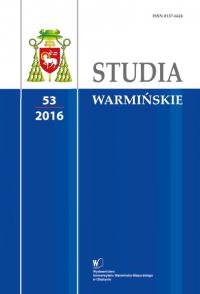Tomistyczno-fenomenologiczna filozofia osoby w personalizmie Karola Wojtyły
THOMISTIC AND PHENOMENOLOGICAL PHILOSOPHY OF THE PERSON IN KAROL WOJTYŁA’S PERSONALISM
Author(s): Ryszard Adam PodgórskiSubject(s): History of Philosophy, Ethics / Practical Philosophy, Phenomenology
Published by: Wydawnictwo Uniwersytetu Warmińsko-Mazurskiego w Olsztynie
Keywords: adequate anthropology; axiology; thomism; phenomenology; phenomenological Thomism
Summary/Abstract: Pope John Paul II is known as Christ’s Vicar. However, many members of the Church do not realise that he was also an eminent philosopher. He was significant enough to develop his own philosophy known as Christian personalism or adequate anthropology. Its concept was presented by Karol Wojtyła in 1969 in a large treatise entitled “The Acting Person”,which beyond doubt can be called the summa philosophiae of the later pope. It contains the modern philosophy of consciousness of the subject that explores the reality, which contradicts traditional metaphysics, which attempted to describe the reality objectively, but only to a small extent dealt with a critical analysis of the subjectivity of our cognition. Karol Wojtyła’s philosophical analyses show that both the earlier philosophy of being and the modern philosophy of consciousness are one-sided approaches. The study of thinking of Aristotle and Saint Thomas Aquinas, as well as Immanuel Kant and Max Scheler, resulted not only in emphasising the diversity of opinions, in exposing their incompleteness, but also in a proposition of resolving the deadlock in which the philosophy of being and philosophy of consciousness were stuck, the deadlock of idealism and realism, of apriorism and empirism. The effort to integrate the philosophy of consciousness and philosophy of being was present in Karol Wojtyła’s work from the beginning of his philosophical quest. It probably stemmed from two convictions. On the one hand, he was convinced that knowledge should arise from experience, on the other – about the rightness of a realistic approach in intellectual cognition.
Journal: Studia Warmińskie
- Issue Year: 53/2016
- Issue No: 53
- Page Range: 39-53
- Page Count: 15
- Language: Polish

